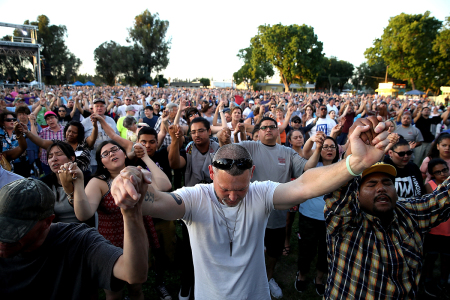Only 2% of Evangelicals define ‘Evangelical’ in political terms: study

Only 2% of Evangelical Protestants believe that the word "Evangelical" should be defined in part or fully by political terms, according to a new report.
Earlier this month, Grey Matter Research and Infinity Concepts released their report, "Beyond the Label: Unmasking Evangelical Identity," featuring data from an early 2023 survey of over 1,000 Evangelical Protestants who were screened for Evangelical beliefs.
According to the report, just 2% of Evangelicals "mention anything about politics or political worldview as defining an evangelical," noting that although "others may see 'evangelical' as a political definition, evangelicals themselves do not see this."
"Only 2% define 'evangelical' at least in part by politics, such as being politically
conservative, supporting Donald Trump, or being Republican," the report states. "So, while others, such as The Economist, commonly conflate this term with politics, evangelicals themselves rarely do."
Thirty-nine percent of Evangelicals defined the word as "focus on evangelism," while 34% stated that Evangelicals have "specific beliefs." About 14% said Evangelicals "prioritize their faith," and 8% said Evangelicals live a "Godly lifestyle."
The report also found that even with Evangelicals who hold a negative perception of the word, only 4% define Evangelical politically. Researchers noted that the Evangelical community could still be associated with partisan labels.
"This does not speak to whether they might associate evangelicals with certain political positions — only that they do not define evangelicals in any part by political perspective," the report stated.
Researchers considered respondents with Evangelical beliefs to be people who agreed with all four of the following theological positions: "The Bible is the highest authority for what I believe," "It is important for me to encourage non-Christians to trust Jesus Christ as their Savior," "Jesus Christ's death on the cross is the only sacrifice that could remove the penalty of my sin," and "Only those who trust in Jesus Christ alone as their Savior receive God's free gift of eternal salvation."
Those are the four requirements maintained in the National Association of Evangelicals' 2015 definition of the term.
Even among Protestants whose beliefs fit the theological definition of an Evangelical, a considerable percentage refused to identify with the label.
"When we ask Protestants who hold evangelical beliefs to choose how they would describe themselves, only 27% choose the term 'an evangelical Christian,'" continued the report.
"But when we directly ask a yes-or-no question about whether the term 'an evangelical Christian' describes them, 61% say it does, while 39% would not use this term to describe themselves."
Data for the report was conducted online last year and derived from "a blend of research access panels" to create a "demographically representative sample," with 1,010 Evangelical Protestants taking part in the study.
In recent years, there has been much debate over the context of Evangelical, what it means and whether it has become more of a political designation than a religious classification amid much mainstream media focus on former President Donald Trump's support from the Evangelical or born-again polling demographic.
In an October 2019 article for The Gospel Coalition, scholar Thomas Kidd wrote that the term "Evangelical" first began to be seen as a political term back in the 1970s, aided by the election of President Jimmy Carter, a Democrat who at the time identified as Evangelical.
"Gallup for the first time began asking survey respondents in 1976 if they were 'evangelical' or 'born again' and pairing that response with political behavior," wrote Kidd.
"Of course, the rise of the Moral Majority in 1979 was a decisive moment in the politicization of the word 'evangelical,' too, but once 'evangelical' became a standard category in polling, the public perception began to shift inexorably toward a political understanding of what it meant to be an evangelical."
Michael Brown, a conservative Christian author and radio host, asked in a piece published by The Christian Post in January if it was "time to scrap the term' Evangelical.'"
"In house, among committed Christians who identify as Evangelicals, or distinguishing between Catholic Christians and Evangelical Christians, the term still speaks of those who hold to a certain set of beliefs," wrote Brown.
"But for the outside world, it may be time for us to reconsider how we who are traditional Evangelicals describe ourselves. It might also lead to more conservations about Jesus and the Scriptures. Shall we take that step?"
In 2018, during the peak of Trump's presidency, the Evangelical polling organization Barna asked over 1,000 respondents to identify adjectives they might use to describe the Evangelical community. The most commonly selected terms related to conservatism, such as 37% who said "religiously conservative" and 27% who said "politically conservative."
Barna noted at the time that those findings fall in line with the fact that Evangelicals, on average, tend to identify themselves as politically conservative and are "more represented among the older and white respondents who typically also claim these views."
In May 2018, the National Association of Evangelicals, which represented over 45,000 churches across 40 denominations, released a statement asserting that the term Evangelical should be viewed through a spiritual, not political, lens.
"Because there are millions of us in the United States and far more of us in other countries around the world, there are subgroups identified by where we live, how we vote, the level of our education or even our local cultural expressions," the NAE stated.
"Each has distinctive beliefs and practices that may be unfamiliar or uncomfortable to one another. Sometimes these subgroups or their leaders are identified as typical of all evangelicals even though there is no consensus, connection or communication between them."





















